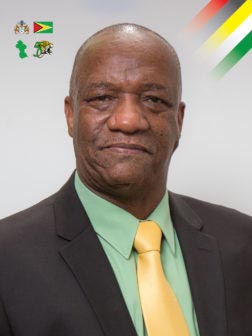Minister of State Joseph Harmon yesterday signalled that Justice Kenneth Benjamin and Justice Yonette Cummings-Edwards would likely be appointed to act as Chancellor and Chief Justice, respectively, in light of Opposition Leader Bharrat Jagdeo’s withholding of his agreement for their substantive appointments.
“There is a constitutional provision which we will look at and if, in fact, there is no agreement for them to be appointed in the substantive position, then, as I said, there is [a] constitutional provision for them to be appointed otherwise,” Harmon told a post-Cabinet press briefing.
In a statement last night, the Ministry of the Presidency said that President David Granger said yesterday that he is going to be receiving legal advice on the matter.
“The problem that has arisen now will be examined by my legal advisors and an announcement will be made, but we needed to have the substantive appointments and he (Jagdeo) has not advanced any reason why he could not confirm and we just have to accept the situation as it is now,” Granger said.
One month after being made aware of President Granger’s nominees, Jagdeo on Wednesday wrote him, relaying his disapproval.
While responding to questions from reporters, Harmon said that constitutionally there is a provision which will now have to “kick in, which would allow for another level of consultation before appointments are made.”
Article 127 (1) of the Constitution states, “The Chancellor and the Chief Justice shall each be appointed by the President, acting after obtaining the agreement of the Leader of the Opposition.
Article 127 (2) allows for the president’s appointment of judges to serve as Chancellor and Chief Justice after meaningful consultation with the opposition leader, in the event that either office is vacant or in the case of the latter that the office holder is unable to perform his/her functions.
Harmon told reporters that given the absence of Jagdeo and his team at Wednesday’s scheduled meeting, Granger took the decision to write the Leader of the Opposition pointing out those things and the fact that the work of the judiciary will not “be held in abeyance or will not be stymied by any interventions whatsoever.”
Justice Benjamin is still sitting in Belize.
Harmon did not provide a clear answer when asked if Benjamin’s arrival here is on hold, given the new development.
“Mr Jagdeo’s rejection, as I said, is constitutional. The president’s powers are also constitutional and there is a provision in the law which provides in the event that there cannot be agreement—because the requirement is for agreement—there is a second level which now requires meaningful consultation,” Harmon said. “I believe that is the next step we’ll have to go to,” Harmon added.
Jagdeo’s office had released the letter sent to Granger after the Ministry of the Presidency posted a photo on its Facebook page of the President and Minister Harmon and Attorney General Basil Williams, stating that the Opposition Leader had been a no-show at a scheduled meeting.
The Opposition Leader’s office later released a statement saying that he had gotten no information from the government confirming a meeting and had therefore dispatched letters to Granger. It also said that around 4 pm on Wednesday, Jagdeo contacted Harmon via telephone and advised him of the letters and indicated a willingness to meet at a convenient time. Jagdeo’s office said that he was therefore surprised at the statement by the Ministry of the Presidency that he had not attended a scheduled meeting.
‘Willing’
While insisting that he was not to be blamed for the meeting not taking place, Jagdeo yesterday said that he was willing to meet with Granger to sort out the appointments.
“Given the need to appoint substantive post holders to these two positions, I am prepared to meet most continuously with the president to see that we settle on a process through which we can come up with names that we can agree on given that the constitution requires agreement,” he told at a press conference yesterday.
After years of the office holders performing the functions of Chancellor and Chief Justice in acting capacities, Guyana has come under growing pressure to ensure that substantive appointments are made to bolster the independence of the judiciary. This matter was recently addressed by President of the Caribbean Court of Justice Sir Dennis Byron.
Up to yesterday, Jagdeo was yet to decide whether he would provide reasons for his rejection of the two nominees. “I chose not to do so in the letter and I will choose not to do so today because I am not in the business of judging people in the public domain,” he said before describing the nominees as two distinguished individuals.
Since it had become known that Justice Benjamin, who is Guyanese by birth, might be nominated to the post of Chancellor, his record as the Chief Justice in Belize has come under scrutiny. Justice Benjamin has had a backlog of judgments in the Caricom member state, which has put him at odds with the bar association there.
It was reported in the Belize media that despite assurances Justice Benjamin would be unable to deliver all 32 of his delayed judgments and this could result in the Belize Bar Association making good on its threat to file proceedings to have him removed from office for misconduct.
According to the Belize Judiciary website, Justice Benjamin received his legal training from the University of the West Indies and the Hugh Wooding Law School in Trinidad and Tobago. It stated that he returned to Guyana, where he practised privately, and served as a Magistrate and the Assistant Judge Advocate for the Guyana Defence Force.
Benjamin had not responded to the questions contained in an email correspondence by this newspaper. He has, however, acknowledged receipt of the email.









